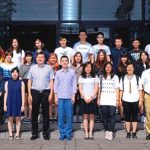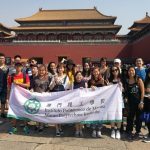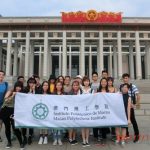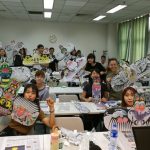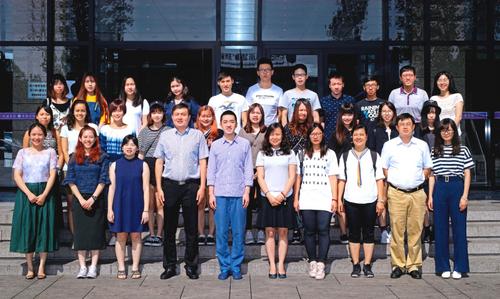 A group photo of the MPI students and the BCLU teachers
A group photo of the MPI students and the BCLU teachers
The Student Affairs Office of the Macao Polytechnic Institute (MPI) and the Beijing Language and Culture University (BCLU) jointly organised the “National Language Working Committee’s Putonghua Shuiping Ceshi and Cultural Study Course” in July 2017. 20 MPI students of different academic disciplines travelled with Professor Sang Dapeng to Beijing this summer to begin a 15-day linguistic and cultural expedition.
During this course, MPI students attended a series of seminars on, among other related topics, the knowledge of Putonghua, pronunciation errors and corrections, a comparison between Putonghua and Cantonese, and an analysis of the language proficiency test. From these seminars, the students walked away with a comprehensive knowledge of Putonghua and the Chinese Pinyin system, as well as a clear understanding of the common errors committed by the Cantonese when speaking in Putonghua. Moreover, by making speeches in Putonghua about themselves in front of the class, the students further enhanced their ability to speak the language and overcame the fear of public speaking. Before the language proficiency test took place, the students also underwent an intensive training module, did a mock examination and received personal feedback on their exam performances.
Apart from studying, MPI students were actively involved in an array of cultural activities. For example, they learnt to write in Chinese calligraphy, painted on traditional Chinese kites, watched a traditional Peking opera, hand-made opera face masks, and visited such famous cultural attractions in Beijing as the Palace Museum and the National Museum. Through these activities, they felt the pulse of the historic city of Beijing and truly appreciated its profound cultural heritage. In their leisure time, they also rode shared bicycles to sightsee the campuses of other institutions of tertiary education in the capital, and along the way pampered their taste buds by trying the local delicacies, such as the famous Beijing roast duck, barbecue strings, fried chicken and other street food, thereby gaining first-hand experience of the local customs.
The participating students stated that both MPI and BCLU are institutions of tertiary education which emphasise the development in their students’ ability to inquire and analyse, and continuously strive for a higher level of internationalization. It was an honour that they could participate in this jointly organised course and would “do so with the maximum enthusiasm”. Not only did they all pass the language proficiency test, but they also had the front-row seat to experience the profoundness and beauty of the Chinese language and the traditional Chinese culture. The students recalled that some teachers were gentle and meticulous while others funny and humorous; despite their personality differences, the teachers taught in such a lively and interesting way that the students “could not help but listen to them carefully”. Furthermore, the course made it possible for the students majoring in different subjects to be together from dawn to dusk and forge a strong bond of friendship between themselves as well as with those students from other colleges and universities and the foreign students studying Chinese in Beijing. What happened over the span of 15 days has become part of the students’ lifelong memories.
As co-organiser, the MPI Student Affairs Office said that MPI has always attached great importance to national education, and that this course provided its students the exact opportunity to not only receive the first-class national education but also to enhance their Putonghua proficiency and update their knowledge of national history. As a result, the students have become more proud of their nation, more confident in their culture and more passionate about China, including Macao, therefore laying a solid foundation for them to be better integrated into the "Belt and Road Initiative" in the future.
View gallery

